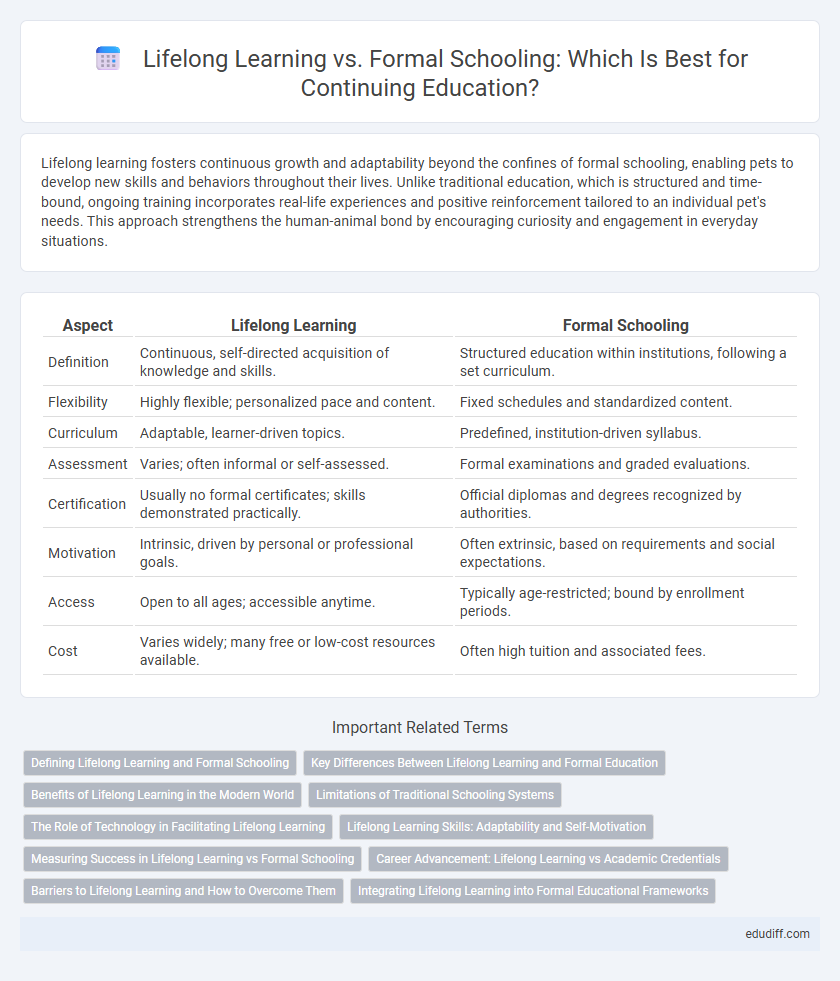Lifelong learning fosters continuous growth and adaptability beyond the confines of formal schooling, enabling pets to develop new skills and behaviors throughout their lives. Unlike traditional education, which is structured and time-bound, ongoing training incorporates real-life experiences and positive reinforcement tailored to an individual pet's needs. This approach strengthens the human-animal bond by encouraging curiosity and engagement in everyday situations.
Table of Comparison
| Aspect | Lifelong Learning | Formal Schooling |
|---|---|---|
| Definition | Continuous, self-directed acquisition of knowledge and skills. | Structured education within institutions, following a set curriculum. |
| Flexibility | Highly flexible; personalized pace and content. | Fixed schedules and standardized content. |
| Curriculum | Adaptable, learner-driven topics. | Predefined, institution-driven syllabus. |
| Assessment | Varies; often informal or self-assessed. | Formal examinations and graded evaluations. |
| Certification | Usually no formal certificates; skills demonstrated practically. | Official diplomas and degrees recognized by authorities. |
| Motivation | Intrinsic, driven by personal or professional goals. | Often extrinsic, based on requirements and social expectations. |
| Access | Open to all ages; accessible anytime. | Typically age-restricted; bound by enrollment periods. |
| Cost | Varies widely; many free or low-cost resources available. | Often high tuition and associated fees. |
Defining Lifelong Learning and Formal Schooling
Lifelong learning encompasses self-motivated, ongoing pursuit of knowledge and skills beyond traditional education settings, emphasizing adaptability and personal growth throughout an individual's life. Formal schooling refers to structured, curriculum-based education typically delivered in institutions like schools and universities, characterized by standardized assessments and credentialing. The distinction highlights lifelong learning's flexibility and intrinsic motivation contrasted with the formal education system's organized framework and external requirements.
Key Differences Between Lifelong Learning and Formal Education
Lifelong learning emphasizes self-directed, continuous skill development across diverse environments, contrasting with formal education's structured, curriculum-based approach limited to specific timeframes and settings. Unlike formal schooling, which prioritizes standardized assessments and credentialing, lifelong learning values practical experience and adaptive knowledge acquisition tailored to individual goals. The flexibility and personalized nature of lifelong learning enable ongoing professional and personal growth beyond the confines of traditional education systems.
Benefits of Lifelong Learning in the Modern World
Lifelong learning fosters adaptability and continuous skill development, essential in today's fast-evolving job market driven by technological innovation. It enhances cognitive flexibility and problem-solving abilities beyond the limitations of formal schooling curricula. By embracing diverse learning sources, individuals increase career resilience and personal growth in an interconnected global economy.
Limitations of Traditional Schooling Systems
Traditional schooling systems often struggle with inflexible curricula that fail to adapt to diverse learning styles and the rapidly changing demands of the job market. Emphasis on standardized testing and rigid schedules limits critical thinking and creativity, hindering skill development necessary for lifelong learning. In contrast, lifelong learning promotes continuous skill acquisition, adaptability, and personalized educational pathways beyond the constraints of formal education.
The Role of Technology in Facilitating Lifelong Learning
Technology revolutionizes lifelong learning by providing ubiquitous access to educational resources through online platforms, mobile apps, and virtual classrooms, enabling continuous skill development beyond formal schooling. Adaptive learning algorithms personalize content based on individual progress, enhancing knowledge retention and engagement. Digital tools also foster collaborative learning communities, connecting learners worldwide for shared experiences and diverse perspectives.
Lifelong Learning Skills: Adaptability and Self-Motivation
Lifelong learning cultivates adaptability by encouraging individuals to embrace change and continuously update their skills, essential in today's fast-evolving job market. Self-motivation drives learners to pursue knowledge independently, fostering proactive problem-solving and personal growth without reliance on formal schooling structures. This combination equips professionals to thrive amid technological advancements and shifting industry demands, surpassing the limitations of traditional education.
Measuring Success in Lifelong Learning vs Formal Schooling
Measuring success in lifelong learning involves assessing skills acquisition, adaptability, and practical application beyond standardized testing used in formal schooling. Formal education traditionally relies on grades and diplomas as quantifiable metrics, whereas lifelong learning emphasizes continuous improvement and real-world impact. Competency-based evaluations and portfolio assessments better capture achievements in lifelong learning by reflecting ongoing personal and professional development.
Career Advancement: Lifelong Learning vs Academic Credentials
Lifelong learning offers practical skills and adaptability that directly boost career advancement in dynamic industries, while formal schooling provides recognized academic credentials essential for meeting baseline job requirements and professional certifications. Employers increasingly value continuous skill development through workshops, online courses, and real-world experiences that demonstrate initiative beyond formal education. Balancing ongoing learning with formal qualifications creates a competitive advantage by combining verified knowledge with up-to-date competencies.
Barriers to Lifelong Learning and How to Overcome Them
Barriers to lifelong learning often include time constraints, financial limitations, and lack of motivation, which hinder continuous skill development beyond formal schooling. Overcoming these obstacles requires flexible learning options such as online courses, micro-credentials, and employer-supported training programs that accommodate diverse schedules and budgets. Cultivating a growth mindset and leveraging community support networks also enhance learner engagement and persistence throughout life.
Integrating Lifelong Learning into Formal Educational Frameworks
Integrating lifelong learning into formal educational frameworks enhances student adaptability by embedding continuous skill development and real-world problem solving into curricula. Educational institutions must establish modular course designs and flexible pathways to accommodate diverse learning paces and interests, leveraging technology for personalized learning experiences. Collaboration between policymakers, educators, and industry experts is essential to align formal education with evolving labor market demands and lifelong learning principles.
Lifelong Learning vs Formal Schooling Infographic

 edudiff.com
edudiff.com